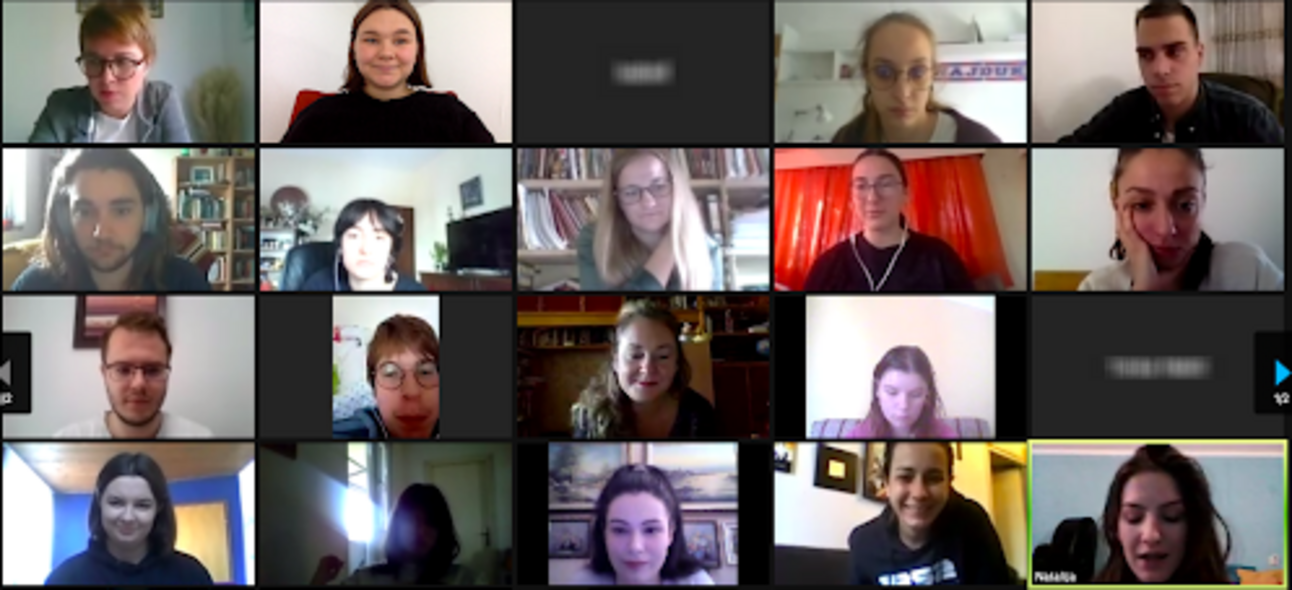Zagreb, November 12, 2021
The Youth Initiative for Human Rights Croatia organized an educational-activist school of transitional justice “Where were you in 2021.?” in the period of October 29-31.
Twenty-seven young people from Croatia and Serbia attended the school.
The participants had an opportunity to learn about transitional justice, dealing with the past, the culture of memory, memory activism, the role of media reporting during the war and post-conflict periods, as well as to familiarize themselves with the existing activist and artistic work in the area of transitional justice.
The first day of the school started with a lecture by Marijana Toma, a transitional justice expert and a consultant for the United Nations Development Program (UNDP). Her lecture focused on the importance of dealing with the past for post-conflict societies. Toma explained the goals of transitional justice, including the right to truth, justice, reparations, democracy, the rule of law, economic development, peace, and reconciliation. During the lecture, she referred to examples from other regional contexts, including Germany, Rwanda, and Latin American countries.
Ivan Jovanović, a transitional justice expert from the United Nations Development Program, held a lecture about the importance of prosecuting war criminals and about the legacy of the International Criminal Tribunal for the former Yugoslavia (ICTY). He contextualized the importance of establishing the ICTY within the development of international criminal law, presenting the work of the ICTY and the International Residual Mechanism for Criminal Tribunals (IRMCT), but also the local courts, in the field of securing criminal justice as part of the wider process of transitional justice.
The first day of the program ended with a lecture by Edvin Kanka Ćudić from the Association for Social Research and Communication (UDIK) from Bosnia and Herzegovina). Kanka Ćudić presented the Central Record of Monuments from the region which was collected by his association, and he critically reflected on the role of monuments in the culture of memory referring to specific examples. Considering the relevance of the topic, we talked about the specificities of the monument which will be set up for victims of Kazani in Bosnia and Herzegovina.
Sven Milekić, a History Ph.D. candidate at the Maynooth University in Ireland, started the second day of the school with a lecture about the impact of dominant narratives in Croatia and Serbia on the construction of national myths by comparing the perception of the Military Operation Storm in both countries. We talked about the changes and additions to the interpretations of the wars since the ’90s up until today, as well as the positions of war veterans in relation to the official narratives.
On the same day, we had a conversation with a journalist Boris Pavelić about the role of media reporting during the war and in the after-war period. In that context, we reflected on the jurisdiction of the International Criminal Tribunal for Rwanda (ICTR) to prosecute journalists, editors, and publishers and considered the impact of court judgments on creating a public opinion about the facts of the wars. We also talked about the role of foreign journalists and the possibilities for objective and fair reporting during the conflict. We problematized the fact that military victories are celebrated in the public space more often than peaceful resolutions of conflict, such as the Peaceful reintegration of the Podunavlje region.
The second day of the school ended with a workshop led by Jelena Jaćimović, an activist and artist, during which Jaćimović presented different forms of activism that she participated in alongside civil society organizations that inspire her. She told us about an exhibit about the genocide in Srebrenica which is currently exhibited in the Srebrenica Memorial Center. Afterwards, the participants had an opportunity to develop their own activist projects in order to combat the glorification of war criminals and their presence in the public sphere, as well as conceptualize opportunities for further education and activism in this field.
During the last day of the school, the participants had an opportunity to learn more about the work of activists. Dalmir Mišković, on behalf of the initiative Unmarked Sites of Atrocities, presented the work of the initiative which marks the unmarked sites of atrocities, relying on the information from the judgments of the ICTY and the Court of Bosnia and Herzegovina, in collaboration with the associations of victims and war veterans.
The last workshop of the school was led by Ajna Jusić, the President of the Forgotten Children of War Association. By screening the Deutsche Welle documentary “Bosnia’s invisible children: Living in dignity” and sharing her personal experience, Jusić emphasized the experiences of children born as a result of wartime rape. She also presented an advocacy campaign “The Name of One Parent”, which combats the discrimination of children born of war. We talked about the discimination of children born of war in relation to other civilian war victims, transgenerational trauma, and the advocacy efforts of the Forgotten Children of War Association focused on the rights of children born of war.
We thank all the lecturers and participants for their time and contributions!
The educational-activist school of transitional justice “Where were you in 2021?” ended with an exchange of impressions, including oral and written evaluation. Based on the impressions of the participants, lecturers, and organizers, we conclude that the school offered important and useful content together with a rich discussion during each of the thematic units.
The activity School of transitional justice is part of a project 4O: Discovery, Awareness, Empowerment, and Organization for Human Rights, whose total value is 170.147€ out of which 149.922,00€ is secured through the financial support of Iceland, Lichtenstein, and Norway as part of the EGP grants. This activity was supported by the Government of the United Kingdom and the United Nations Development Program (UNDP).
